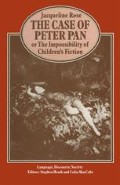Abstract
We have been reading the wrong Freud to children.
Access this chapter
Tax calculation will be finalised at checkout
Purchases are for personal use only
Preview
Unable to display preview. Download preview PDF.
Notes
For more explicitly psychoanalytic discussions ofPeter Pan see John Skinner, ‘James M. Barrie or The Boy Who Wouldn’t Grow Up’ (Skinner, 1957), Martin Grotjahn, ‘The Defenses Against Creative Anxiety in the Life and Work of James Barrie’ (a commentary on John Skinner’s article) (Grotjahn, 1957), and G. H. Pollock, ‘On Siblings, Childhood Sibling Loss and Creativity’ (Pollock, 1978).
Copyright information
© 1984 Jacqueline Rose
About this chapter
Cite this chapter
Rose, J. (1984). Peter Pan and Freud. In: The Case of Peter Pan or The Impossibility of Children’s Fiction. Language, Discourse, Society. Palgrave Macmillan, London. https://doi.org/10.1007/978-1-349-17385-3_2
Download citation
DOI: https://doi.org/10.1007/978-1-349-17385-3_2
Publisher Name: Palgrave Macmillan, London
Print ISBN: 978-0-333-35440-7
Online ISBN: 978-1-349-17385-3
eBook Packages: Palgrave Literature & Performing Arts CollectionLiterature, Cultural and Media Studies (R0)

